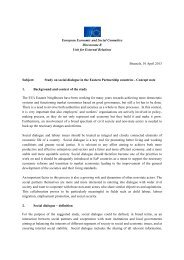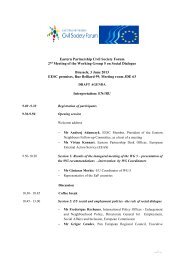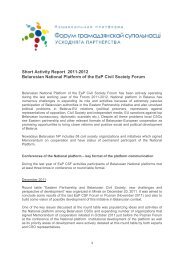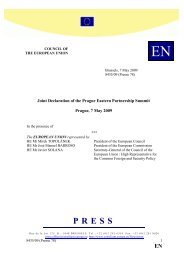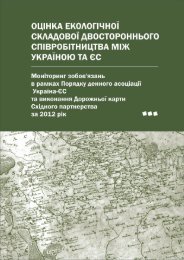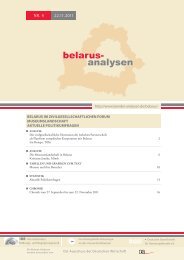Non-formal education - Eastern Partnership Civil Society Forum
Non-formal education - Eastern Partnership Civil Society Forum
Non-formal education - Eastern Partnership Civil Society Forum
You also want an ePaper? Increase the reach of your titles
YUMPU automatically turns print PDFs into web optimized ePapers that Google loves.
Today, recognition of non-<strong>formal</strong> <strong>education</strong> is permitted according to the acting legislation in Georgia<br />
only at the vocational <strong>education</strong> level. Attestation of the qualification that was obtained after the non<strong>formal</strong><br />
<strong>education</strong> is carried out by the attestation bodies. The attestation aims to:<br />
a) review/check the knowledge and skills of the person, who bares non-<strong>formal</strong> vocational <strong>education</strong><br />
and assign him/her the relevant qualification or change the old one;<br />
b) recognize the vocational <strong>education</strong> and qualification obtained abroad;<br />
c) assess the <strong>formal</strong> <strong>education</strong> obtained in Georgia and approve the relevant qualification.<br />
Except of Law on Vocational <strong>education</strong> <strong>Non</strong>-<strong>formal</strong> <strong>education</strong> in Georgia is not officially defined and<br />
regulated on the legislative level. Despite significant changes in the <strong>education</strong>al system, a policy on<br />
non-<strong>formal</strong> <strong>education</strong> and respective funding is until now practically not existing and the place of non<strong>formal</strong><br />
<strong>education</strong> in the <strong>education</strong> system remains uncertain. In Georgia learning that occurs outside<br />
the <strong>formal</strong> learning system is still not well understood, not appropriately visible, and, as a consequence,<br />
appropriately valued. Until now it has also been under-researched.<br />
Other Political and Strategic Documents<br />
There are several political and strategic documents which refer to <strong>education</strong>al issues in Georgia.<br />
Among them are: EU-Georgia Action Plan, elaborated within the framework of the European Neighborhood<br />
Policy; Basic Data and Directions (BDD), 2010-2013 and State Strategy for Regional Development of<br />
Georgia. Though none of these documents refers to the term “non-<strong>formal</strong> <strong>education</strong>” directly, they are<br />
important to be mentioned in context of lifelong <strong>education</strong> and adult <strong>education</strong> which definitely implies<br />
non-<strong>formal</strong> <strong>education</strong>.<br />
European Neighborhood Policy – Action Plan (EU-Georgia)<br />
One of the priority directions of the Action Plan agreed upon by EU and Georgia within the framework<br />
of the European Neighborhood Policy is to ensure economic development, poverty reduction and social<br />
equality. To achieve these goals, a great amount of measures to be taken refers to the reform in the field<br />
of <strong>education</strong>, such as to “encourage life-long and life-wide learning opportunities … promote sustainable<br />
development of human resources and human capital”.<br />
Furthermore, under the Action Plan, Georgia has taken on a responsibility, through approximation<br />
of EU standards and practices with that of Georgia, to “ensure access for all to high quality <strong>education</strong><br />
by providing sufficient funding, setting up quality assurance services, reforming <strong>education</strong> and training<br />
systems, including vocational <strong>education</strong> and training and fostering “lifelong learning”, in particular<br />
through implementation of national <strong>education</strong> reform strategy”.<br />
Basic Data and Directions (BDD) of 2010-2013<br />
Basic Data and Directions (BDD) of 2010-2013 covers the priorities of Georgia in the course of<br />
these years, programs related to the priorities, activities, possible results and feasible funds.<br />
Analyze of the document in the context of the adult <strong>education</strong> shows that the government recognizes<br />
the adult <strong>education</strong> as one of the ways of solving social (including employment) problems which<br />
vulnerable groups are facing. The document states that “the government shall aid Internally Displaced<br />
Persons (IDPs) …. in developing professional skills, which shall facilitate their employment”. The same<br />
is affirmed in the State Strategy on internally displaces Persons, according to which “it is essential to<br />
promote vocational <strong>education</strong> of IDPs within the framework of state <strong>education</strong>al programs, which shall<br />
become an instrument for social integration of IDPs. It is necessary to encourage vocational learning<br />
motivation, increase its availability, as well as raise awareness of vocational learning, training and other<br />
<strong>education</strong>al capabilities”.<br />
One of the priorities of the Ministry of Corrections and Legal Assistance of Georgia, as envisaged in<br />
the BDD, is the facilitation of general and vocational <strong>education</strong> of convicts within a unified <strong>education</strong>al<br />
system, which shall assist the convicts to get employed and reintegrate in the society after being<br />
released.<br />
It is similarly remarkable to review the priorities of the Ministry of Education and Science of Georgia<br />
under the BDD, within the context of the adult <strong>education</strong>. One of such priorities is the promotion of<br />
54






